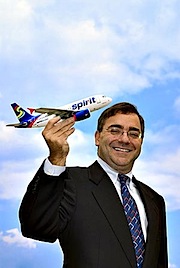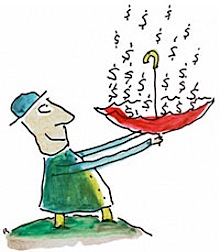
As many of you are aware, a number of pilots representing the group of pilots at US Airways which was originally with America West, or the “West” pilots as they are nornally referred to — entered into litigation last year against USAPA, the independent pilot union that was created as a result of the original ALPA merger seniority award. That organization was, and is, made up primarily of old US Airways’ pilots, or the “East” pilots as they are known.
The reason for the litigation — the seniority award.
As many of you also know, this spring, after months of intense legal wrangling, US District Court Judge Neil Wake had whittled down the case to one central issue: whether the union is fairly representing all the pilots at US Airways. The legal term is duty of fair representation, or DFR.
The verdict after all the screaming and teeth gnashing? The court found in favor of the former America West pilots. In other words, the court agreed that yes, the formula used for the award was fair, and that by dumping ALPA and setting up USAPA in an attempt to circumvent that award — that the union did indeed not represent all of its members fairly.
But as we all know — this decision, which cost both sides millions of dollars in legal fees, really brought very little closure to anything.
First, the braintrust at USAPA basically refuses to admit that this means it needs to back off and allow the original ALPA seniority award, which used a “blended” process, and not date-of-hire method, to be used as part of any collective bargaining agreement. So essentially there has still been no movement in terms of negotiating a new contract agreement for the pilots.
And second, there is the question of damages.
And no damages are more attention-getting than the legal fees that both sides have incurred since the start of this huge mess.
This week I continue to get caught up on all my email that came in over the last couple of weeks, and today I was reading the latest missive from Leonidas, the group that sued USAPA.
In their latest missive, the group tells its members that its legal team has submitted a request that their legal fees be paid by the union, or USAPA.
“In essence though, we are making a request for the reimbursement of all legal fees and non-taxable expenses spent while protecting the careers of our pilots and protecting the validity of “binding arbitration.” To do this, we are not asking for anything too novel in that we have requested that all members of the bargaining unit share in the expense. There is no division of East or West with regard to who would be forced to pay for this legal action. On the surface, this may seem unjust, but what must be considered is the superb return on investment for all US Airways pilots should this request be granted. If the plaintiffs prevail here, then the $1.8 million in total expenses would be repaid to our legal counsel, and the balance of contributions received thus far would remain in the Leonidas trust, standing by to protect the minority for many years to come, just as stated in our Leonidas LLC objectives which were published long ago; “’We will remain perpetually poised to aggressively defend our rights until such time when we are no longer threatened.”’
So just how much are we talking about?
As they said in their comments above, the legal fees for the America West pilot group now stand at about $1.8 million.
And the litigation is not over yet.
As the folks at Leonidas point out,
“Back to that return on investment for the victims (for simplicity sake, we will use a little “chainsaw” math in this analysis):
$1,821,000 Approximate West legal expenses
5200 Approximate number of pilots subject to USAPA
$350 Approximate pro-rata share of expenses
$1,260,700 Approximate East pilot share of expenses
3600 Approximate number of East pilots
1600 Approximate number of West pilots
$560,300 Approximate West pilot share of expenses
The net result is that the class of West pilots would receive $1,260,700 from the East pilots in return for their own contributions of only $560,300- an instant return on investment of 125% for the West pilots. We will acknowledge that this does not seem fair to those West pilots who have voluntarily funded our legal effort on the front end, but it would have the benefit of compelling those unwilling West beneficiaries of our legal campaign to finally contribute something nonetheless. Of course, true justice would be served by seeking these funds directly from the primary author of the entire USAPA saga; Lee Seham himself. That will be up to either the current USAPA leadership [unlikely], or perhaps a future and competent leadership team that will take over once Cleary and his team are removed and forever banished from union affairs.”
So while now the two sides continue to fight out the damages part of the ruling in court — let’s look again at how much money we’re talking about — just to pay off the legal fees for the America West-led group of plaintiffs. Almost $2 million bucks.
And I would add — how much is USAPA itself now on the hook for — in terms of its own legal fees it has racked up in defending this ridiculous stance of theirs?
But here’s the ironic part. All those expenses are having to be paid out of the general union dues pot — that same dues pot that is supposed to fund USAPA, which is supposed to represent all pilots at the airline. Yes, including the ex-America West guys.
I’ve said it before, and I have to say it again. The utter stupidity of this situation — on more than one front — continues to just flat out amaze me.
I’m not sure we’ve ever seen anything, in terms of scope, that rivals this situation in terms of sheer union leadership idiocy.
And for this industry — that’s saying something.
Here’s hoping that the pilots at US Airways elect new union leadership at USAPA that understands, at least, the concept of rational thinking. Or maybe ….. reasoned thinking. Or maybe just …..thinking. Period.






